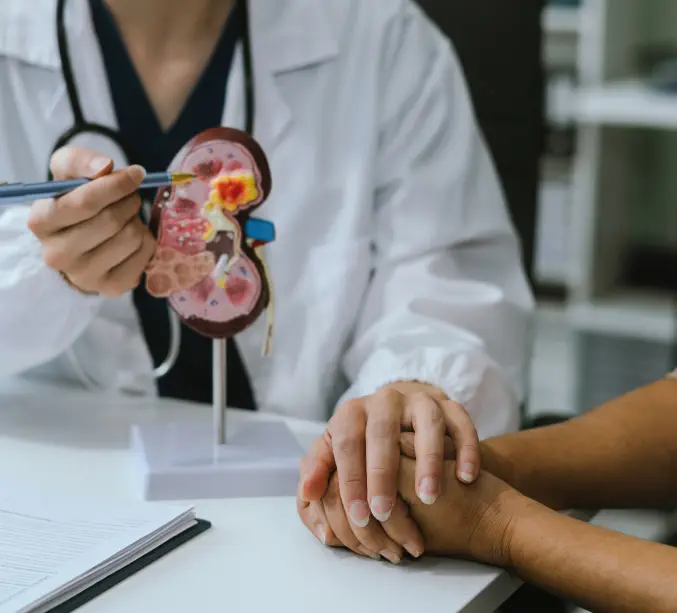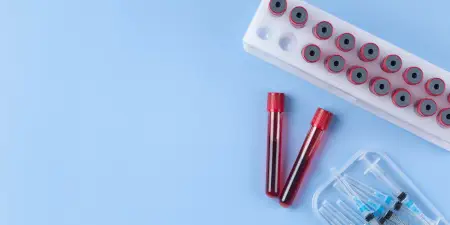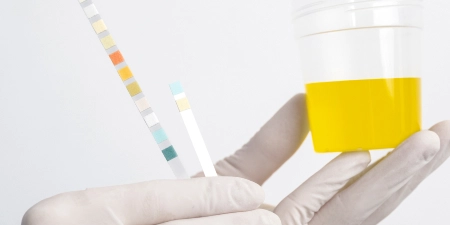Urinary Stones

Personalised Care for Managing Urinary Stones
Your kidneys are crucial in filtering waste chemicals from your body into urine. However, certain factors may cause the substances to crystallise, forming urinary stones or renal calculi. These stones or renal calculi can block the flow of urine, causing intense pain and severe infections that can impair kidney function. These calculi are not restricted to the kidney. They can also be found in the bladder, urethra, or ureter, the connecting tube draining urine from the kidney to the bladder.
Urinary stones can hinder renal health, so they require specialised medical attention. Dr. Aarthy P is dedicated to providing specialised care for this renal condition.
She is committed to guiding you through the entire process, from the initial diagnosis through treatment. Her treatment modalities, ureteroscopy, lithotripsy, and minimally invasive surgeries, eliminate or break down the calculi to alleviate the symptoms and minimise the risk of recurrence.
Dr. Aarthy, the best urology doctor in Chennai, designs tailored treatment plans that cater to each patient’s needs, ensuring faster recovery and improved outcomes. Your comfort and well-being are her top priorities.
Urinary Stones
Causes & Symptoms
- The Causes
- The Symptoms
- Inadequate fluid intake leads to concentrated urine and dehydration.
- Genetic predisposition to renal calculi.
- Excess intake of salty and sodium-rich foods, oxalate-rich foods and animal protein.
- Excessive use of supplementary drugs like Calcium tablets and Vitamin C.
- Chronic inflammatory bowel disease like Crohn’s disease increases oxalate levels, minimises urine volume and causes stone formation.
- Excess body weight causes changes in urine acidity, which in turn leads to the formation of renal calculi.
- Hyperparathyroidism impacts calcium metabolism and increases the risk of renal calculi.
The real pain and discomfort with kidney stones arise mostly when they move into the ureter. Once the stones start passing through this passage that connects the bladder and the kidney, you may experience:
- Sharp, unbearable pain in the lower back, lower abdomen, groin, and sides as the calculi move through the ureter.
- The presence of blood in the urine(also called Hematuria) due to irritation from stones.
- Multiple episodes of vomiting and severe nausea as the body’s response to the severe pain. An obstruction in the urine flow from the kidney to the bladder can also trigger the nerves in the GI tract, leading to nausea and vomiting.
- The presence of pus in the urine. This indicates kidney-related infection alongside the stones.
- Lesser urine output due to the discomfort caused by pain and the reluctance to urinate caused by the stone.
- Burning and painful sensation while voiding the bladder. This happens when the stones irritate the ureter.
- A continuous sensation of urgency to void the bladder despite producing only a small amount of urine.
- Feverishness, chills, inflammation, and signs of infection, particularly in severe cases.
Diagnosing Urinary Stones for Effective Treatment
Dr. Aarthy P is keenly interested in identifying the symptoms linked to kidney stones. To determine the root cause of your problem, she may recommend the following diagnostic tests and procedures.
Stone-Free Relief: Personalised Solutions for Urinary Health

Surgeries for Large Stones
A non-invasive procedure that uses ultrasonic energy or sound waves to break down large stones into smaller pieces that are easily passed through urine. This multi-session procedure may cause bruising, blood in urine, and pain.
In ureteroscopy, a slender, telescope-like instrument called a ureteroscope is used to navigate through the urethra and bladder to reach the ureter.Once the stone is located, it is fragmented into smaller pieces using specialised tools and removed. Sometimes, a temporary stent may be placed in the ureter to facilitate healing and ensure proper drainage.
This minimally invasive surgical procedure involves making a small incision in the back to access the kidney directly. Using specialised instruments, the stones are broken into smaller fragments and removed. While effective, the PCNL procedure carries potential risks, including infection, bleeding, or injury to nearby organs. A temporary drainage tube may be placed to help remove excess fluids and promote healing.
Conservative Treatment for Small Stones
Adequate intake of upto 2-3 litres of water to dilute the urine, unless otherwise advised by your doctor.
Powerful pain relievers to help alleviate the pain and discomfort while passing stones.
Alpha-blockers can be utilised to relax the ureter muscles, aiding in the easier passage of stones.
Your Renal Health is Precious: Safeguard it Today





